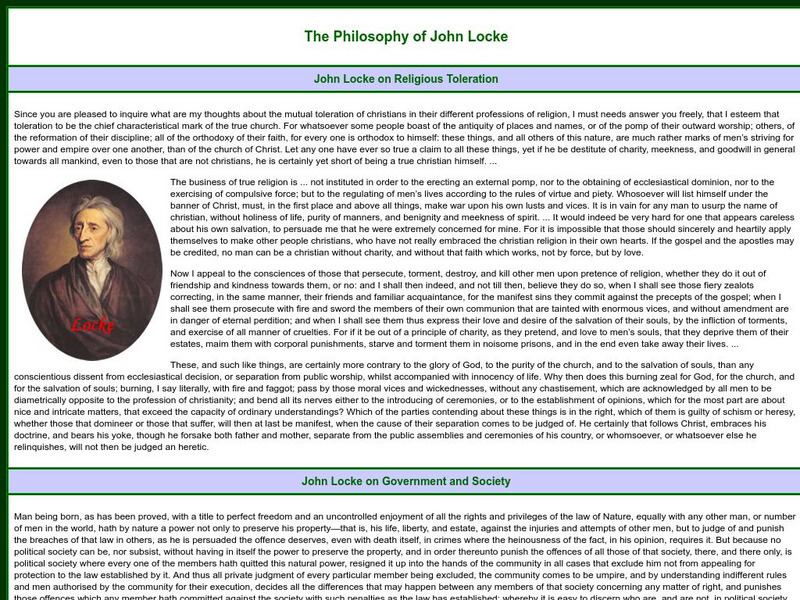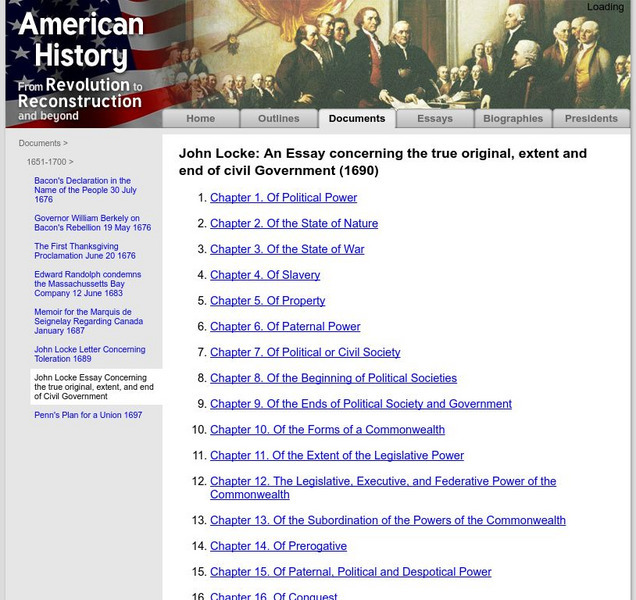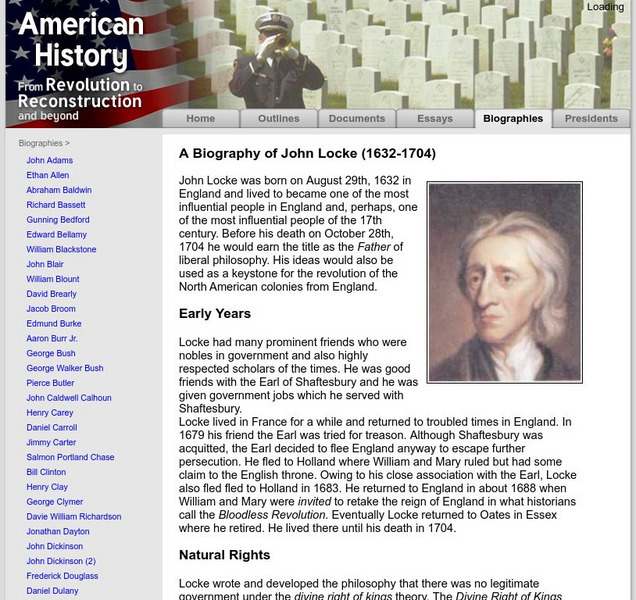Curated OER
Why Do We Need a Government?
Students are introduced to the basic concepts of the natural rights philosophy. After being introduced to the concept of natural rights, students are asked to speculate on what might be the benefits and problems of living in a state of...
Curated OER
ROAD TO REVOLUTION
Students explain how England's Glorious Revolution affected the colonies and investigate how the Great Awakening and Enlightenment affected the colonies. Students determine how the outcome of the French and Indian war affected N. America...
Clever Student Training Company
Eliminating Weak Essay Material
A strong essay eliminates weak or unnecessary material. Determining what information contributes to an essay and what information should be deleted is a skill readers and writers of informational text must develop. Class members practice...
Curated OER
Revolutions in Latin America (19c - Early 20c)
The history of the Latin American revolutions - and the philosophies behind them - is the focus of this comprehensive presentation. From the theories of the European Enlightenment, to the Revolutionary Wars of America and France, Latin...
Curated OER
The Drafts of the Declaration of Independence
Seventh graders compare drafts of the Declaration of Independence. In this primary source analysis lesson, 7th graders access copies of Thomas Jefferson's original draft of the document and compare it the final document that gave birth...
Curated OER
Revolution! Freedom for All?
Twelfth graders examine the causes of freedom by revolutionary patriots. In this Civics and Economics lesson, 12th graders analyze primary sources. Students work cooperatively to write a freedom declaration for their group.
Curated OER
The Declaration of Independence
Students reflect on the Declaration of Independence. In this U.S. History lesson, students read the Declaration of Independence then complete an activity and worksheet on the topic.
Curated OER
Honoring Property Rights
Students examine the issue of cheating. In this property rights lesson, students define honor and discuss intellectual property rights as they explore a case study.
Curated OER
The Glorious Revolution, the American Revolution, and the French Revolution
Students relate the Glorious Revolution, the American Revolution, and the French Revolution through web based research and scenarios.
Curated OER
Writing a Classroom Constitution
Students work together to write a Constitution for their classroom. As a class, they discuss the need for laws and how the concept of compromise is important. In groups, they compare the process they used for writing the Constitution...
Curated OER
Case Study - American Revolution 1775-1781
For this American Revolution case study worksheet, young scholars read a brief overview pertaining to the time period in American history and then respond to 2 short answer questions.
Curated OER
Measuring Citizenship
Twelfth graders explore citizenship. They discuss what makes a person a citizen of a country. Students examine the differences between resident aliens and naturalized citizens. They discuss the process for becoming a citizen and decide...
Curated OER
The Declaration of Independence
In this social studies worksheet, students locate 54 words relating to the Declaration of Independence in a word search. Students may self correct by selecting the link at the bottom of the page.
Curated OER
History-5 Word Search
In this literacy worksheet, students find the words that are in the word search puzzle that focus upon the vocabulary that is from the theme of the sheet.
Henry J. Sage
Sage American History: The Philosophy of John Locke
Writings of philosopher John Locke on religious toleration, government and society from which students will gain an understanding of the underpinnings of American government.
Oregon State University
Oregon State University: John Locke
This Oregon State University site details the life of the great philosopher John Locke. The site provides a brief bio of Locke, information on his writings such as the Two Treatises of Civil Government, as well as a timeline of his life...
University of Groningen
American History: Documents: John Locke on Government
This site from the University of Groningen provides the complete John Locke's "Second Treatise on Government." It discusses everything from slavery and property to civil government and its functions.
Victorian Web
Victorian Web: John Locke
A brief but informative biography is provided, about John Locke and his major works and accomplishments. There is a black and white portrait, along with links to additional information included.
University of Groningen
American History: Biographies: John Locke
The University of Groningen provides information about the 17th century British liberal philosopher. Includes concise biographical information and a link to the text of "A Letter Concerning Toleration." Read about what part of his...
Philosophy Pages
Philosophy Pages: John Locke (1632 1704)
This site offers a brief biography of philosopher John Locke and highlights of his accomplishments. The summary traces the development of his political beliefs through contrast with other writers of his time. Site includes a bibliography...
Internet Encyclopedia of Philosophy
Internet Encyclopedia of Philosophy: John Locke (1632 1704)
Extensive overview of the English philosopher covers his studies, particularly in medicine, and his published works. Includes a bibliography.
Other
Liberty Online: Locke's Second Treatise on Government: Of Conquest
At this site you can read Chapter XVI, Of Conquest, by John Locke stating that the basis of any government must be the consent of the people, and implying in the writing that war or revolution is often mistaken as consent. (Published in...
iCivics
I Civics: Why Government?
Dig into philosophers Thomas Hobbes and John Locke's ideas and see how they've influenced those that have followed in their footsteps.
Bartleby
Bartleby.com: Two Treatises of Government
Presents an evaluation of John Locke's "Two Treatises on Government." Site explains how Locke refutes the doctrine of absolute power and attempts to reconcile the liberty of the citizen with the political order.





















